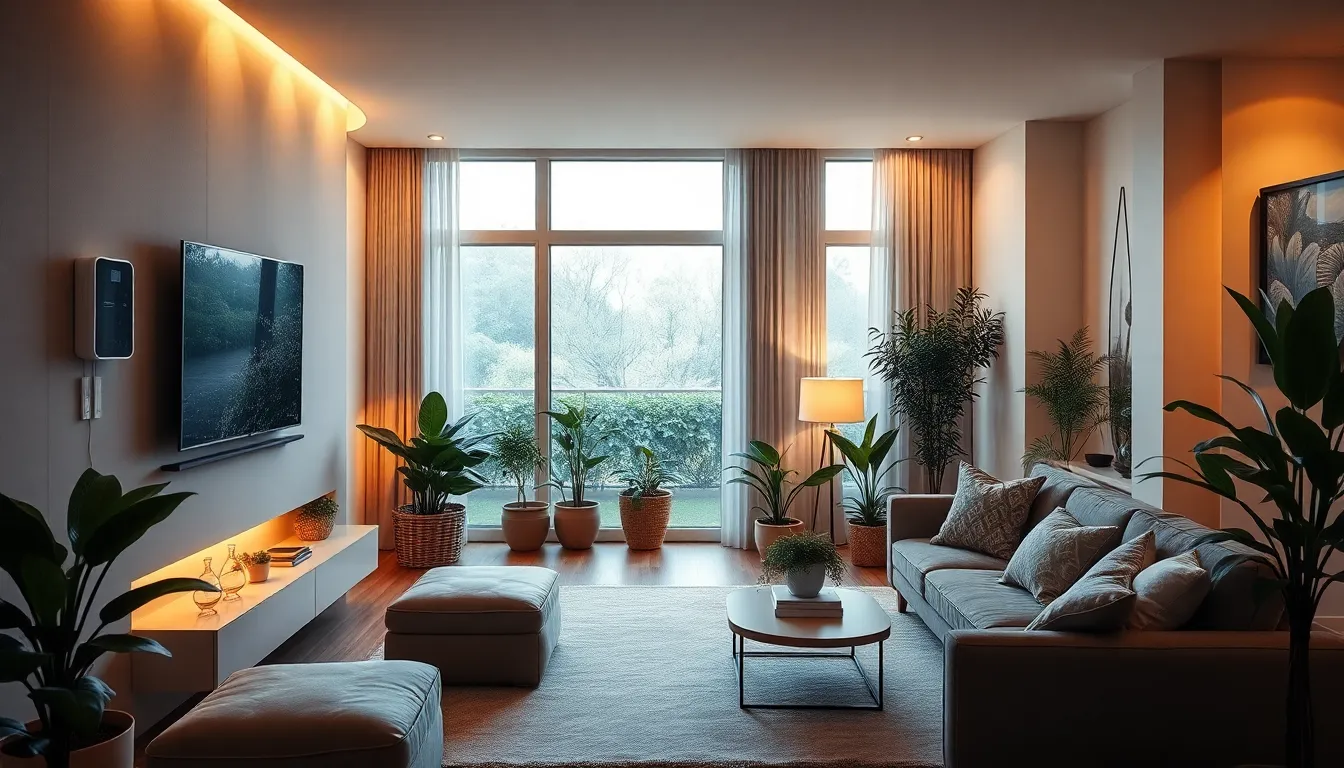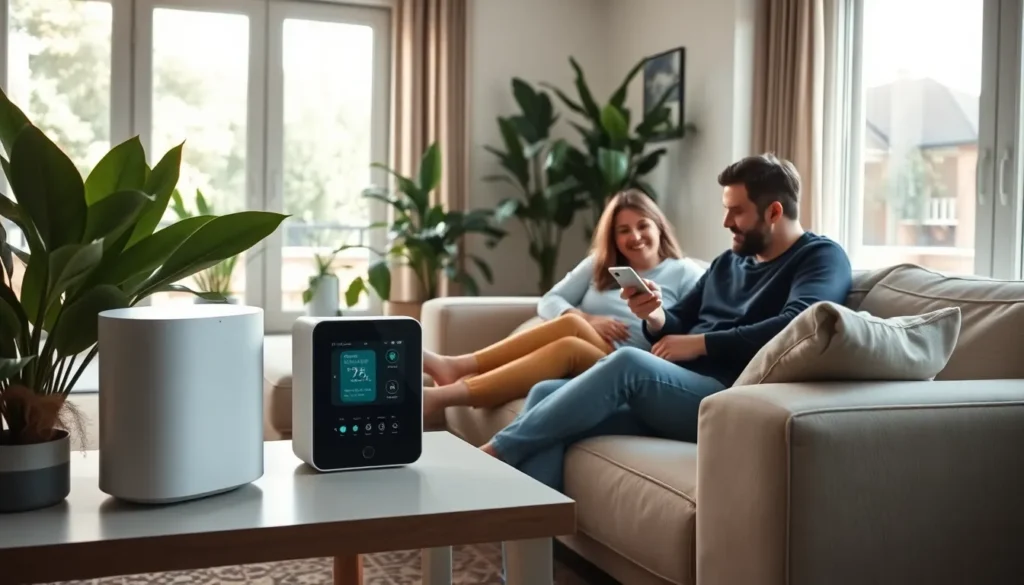Table of Contents
ToggleHumidity can be a sneaky little gremlin, wreaking havoc on comfort levels and home environments. It’s like that uninvited guest who shows up to every party, making everyone feel sticky and cranky. But fear not! Smart humidity control is here to save the day, turning your living space into a climate-controlled paradise.
Overview of Smart Humidity Control
Smart humidity control systems provide a sophisticated approach to managing indoor moisture levels. These systems automatically adjust humidity according to specific environmental conditions. Sensors detect humidity fluctuations, allowing for real-time responses to changes.
Automated devices can integrate with home environments to optimize comfort. They often connect to other smart technologies, such as smart thermostats or HVAC systems, enhancing overall climate control. Through seamless integration, these systems maintain ideal humidity levels while conserving energy.
Advanced humidity control solutions also offer remote monitoring capabilities. Users can track humidity levels through smartphone apps, ensuring immediate adjustments if necessary. Offering customizable settings, these devices cater to various preferences and needs.
Significant benefits accompany smart humidity control, including improved air quality and reduced risk of mold growth. These systems contribute to preserving furniture, flooring, and other household items by maintaining optimal moisture levels. Ultimately, smart humidity control enhances comfort and promotes a healthier living environment.
Enhanced user experience comes from advanced features like scheduling and predictive algorithms. Systems can learn homeowner habits, adjusting settings for efficiency and effectiveness. Smart humidity control represents a crucial element in modern home comfort technology.
Benefits of Smart Humidity Control

Smart humidity control systems offer significant advantages for home environments. These benefits enhance comfort, conserve energy, and promote health.
Improved Comfort Levels
Optimal humidity levels contribute to a more comfortable living space. Humidity control systems automatically adjust moisture levels, preventing conditions that lead to discomfort such as dryness or dampness. Consequently, consistent humidity levels enhance overall indoor air quality. Maintaining proper humidity keeps furniture and flooring in good condition, reducing wear and tear. Enhanced comfort also supports better sleep quality and mood improvement.
Energy Efficiency
Smart humidity controls enhance energy efficiency by optimizing HVAC performance. Systems regulate how much energy users consume based on humidity demands. During periods of high humidity, these systems can reduce the need for excessive air conditioning. This proactive management of temperature and humidity prevents energy waste, lowering utility bills. Implementing such technology often leads to significant energy savings, making homes not only more sustainable but also cost-effective.
Health Benefits
Health-related issues due to improper humidity levels can be mitigated with smart humidity controls. Excessive moisture creates an environment conducive to mold and dust mites, which can trigger allergies and respiratory problems. Smart systems maintain ideal humidity levels, significantly reducing these risks. Additionally, balanced humidity levels help alleviate dry skin and throat discomfort. By promoting a healthier indoor environment, residents experience fewer health-related concerns and enjoy an overall better quality of life.
Technologies Behind Smart Humidity Control
Smart humidity control relies on advanced technologies to maintain optimal indoor moisture levels. These innovations create a more comfortable living environment significantly.
Sensors and Monitoring
Humidity sensors play a crucial role in smart humidity control systems. They continuously monitor moisture levels, detecting changes that affect indoor air quality. Many devices feature digital sensors that provide real-time data to users via smartphone apps. The integration of humidity sensors with temperature sensors enhances accuracy, ensuring more precise adjustments. Some systems even collaborate with external weather data, allowing for adaptive responses to conditions outside. These features help maintain consistent humidity levels, resulting in improved comfort and reduced energy costs.
Automation and Smart Systems
Automation elevates the efficacy of smart humidity control. Systems utilize algorithms to predict changes in humidity, allowing them to adjust settings proactively. Integration with smart home ecosystems enhances functionality, enabling seamless communication with devices like thermostats and air purifiers. Users benefit from scheduling features, which allow them to set preferred humidity levels at specific times. Remote access via mobile applications ensures users can monitor and modify their settings even when away from home. This technology not only optimizes indoor climates but also reduces energy usage, contributing to sustainability efforts.
Applications of Smart Humidity Control
Smart humidity control systems find extensive applications across different settings. These systems enhance comfort and health, significantly improving indoor environments.
Residential Use
In residential spaces, smart humidity control provides comfort and contributes to health. Automatic adjustments maintain optimal humidity levels, which prevent mold growth and protect furniture. Families benefit from cleaner air, as these systems reduce allergens and dust mites. Homeowners appreciate features like scheduling, allowing them to set preferred humidity levels based on daily routines. Remote access through smartphone apps offers further convenience, enabling adjustments while away from home. Energy efficiency remains a priority, with systems designed to integrate with HVAC units and optimize overall performance.
Commercial Applications
Commercial settings also leverage smart humidity control for various benefits. Businesses enjoy improved climate control, promoting employee productivity and comfort. Retail environments, such as clothing stores, use humidity management to protect merchandise from damage. By maintaining consistent humidity levels, organizations reduce the risk of equipment failure in data centers and laboratories. Industrial operations also benefit, as proper humidity levels prevent adverse effects on manufacturing processes. Companies appreciate the integration with existing building management systems, allowing for seamless operation and energy conservation across facilities.
Future Trends in Smart Humidity Control
Emerging technologies promise to reshape smart humidity control systems significantly. Newer humidity sensors offer enhanced accuracy and faster responses to environmental changes. Integration with artificial intelligence drives predictive algorithms, allowing systems to learn user preferences over time.
Smart humidity control increasingly leverages data from external weather forecasts. Such integration enables real-time adjustments based on anticipated changes in humidity. IoT connectivity expands capabilities, linking devices across smart home networks for seamless operation.
User interfaces are evolving to become more intuitive. Mobile apps now feature dashboards with real-time insights into humidity levels and recommendations for adjustments. Voice-activated controls are becoming commonplace, allowing users to simply speak commands for hassle-free operation.
Sustainability remains a critical focus. System designs prioritize energy efficiency, contributing to lower utility bills while maintaining comfort. Future systems may utilize renewable energy sources, further enhancing their environmental impact.
Smart humidity control finds applications beyond residential settings. Industries such as agriculture benefit significantly, with systems optimizing humidity for crop growth. Retail environments appreciate advanced features that protect products from moisture, while healthcare facilities ensure conditions remain pristine for patient safety.
Research continues to enhance materials used in smart humidity control devices. Evolution in smart materials may lead to self-adjusting technologies that respond to changing humidity levels dynamically. As this technology develops, users can expect more proactive solutions tailored to their individual needs.
Smart humidity control is transforming the way individuals and businesses manage indoor environments. By effectively regulating moisture levels, these systems enhance comfort and promote healthier living spaces. With features like real-time monitoring and seamless integration with other smart technologies, users can enjoy a personalized climate that supports their well-being.
As advancements continue to emerge, the future of smart humidity control looks promising. Enhanced sensors and AI-driven algorithms will further refine humidity management, making it more efficient and user-friendly. This evolution not only benefits residential spaces but also plays a vital role in commercial and industrial settings. Embracing smart humidity control today paves the way for a more comfortable and sustainable tomorrow.







